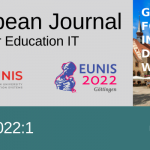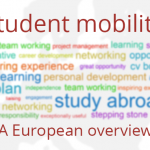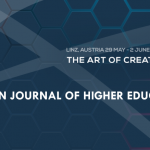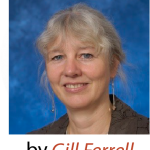In my last post I imagined how universities and Higher Education, more generally, could benefit from a blended education, partly as SPOC, i.e. small online courses, and partly face to face.
Apart from thedisruption oflearning and teaching methods, the financial costs and human resources required to generalize the use of SPOCs will forceour institutionsto cooperateto build anduse common courses in their curricula. For those attending EUNIS congresses, this is not new: our colleagues from the Bavarian Virtual University build courses for all Bavarian universities. However, for most universities, this will bea significant changeof the current paradigmof the teacher,alone, facinghis studentsin the amphitheaterand of the students using only the notes provided by their teachers.Thus building and sharing online courseswill be an interestingtransformation of the modeof operationof our venerableinstitutions, butit goes muchfurther.
The revolution of MOOCs will have significant side effects.
A MOOC or a SPOC is active over a limited period of six to eight weeks. A conventional teaching module covers one semester. So there is a gap between the durations of these two types of events. The MIT has already thought about this contradiction: it is reconsidering the organization of all of its teaching modules to turn them into shorter units, so as to be able to switch some of them online, whenever decided. My interlocutors at MIT told me that it does not mean that all modules will be transformed into SPOCs but they want to remove any obstacle for any move in new ways of teaching
So I have the feeling that the massive introduction of SPOCs will quickly lead our universities and colleges to the same conclusion and that it will induce a new organization of the university year and of the delivery of grades. This is far from neutral and represents much more than just an administrative reorganization!
A very interesting change is that it will allow a greater diversity of the curricula. The combination of shorter modules will allow to better adapting the studies to the students professional projects and will. The ability to remotely participate to some courses will facilitate the diversity of curricula since collisions in timetables may be avoided.
Universities are the warrant of the consistency of the curricula and do not graduate collectors of a scattered knowledge. Their responsibility is to build and to offer curricula that combine both fundamental knowledge, that allow everyone to progress throughout his/her life, and to learn professional skills for immediate employment. Therefore, by nature, they must build and offer coherent combinations of courses that make sense. The best universities will be those that simultaneously allow personal enrichment and preparation for the careers of today and tomorrow. For instance, a student with a major in physics may be interested in philosophy and management as another, with a major in law, will choose to learn sociology and mathematics! Rare, highly specialized disciplines will be better preserved because distance learning will allow gathering the necessary number of students in one single course. Videoconferencing will permit to teachers and students to interact enhancing the interaction of a classical SPOC. My personal experience, in my university, is that it preserves most of the interests of face-to-face exchanges. Blended learning and online courses allow new exciting combinations of courses and the top universities will be those that can offer consistent rich learning pallets.
These perspectives fit the spirit of the designers of the Bologna process because, if universities agree, students will be able to build their curricula with courses taken in different universities in Europe. This is a key factor in building a true European training: today a number of students are not able to study abroad because of a lack of financial support. SPOCs and blended learning will open new opportunities to a majority of European young people. Agreements between universities will attract a number of students interested in building true European curricula. Do the universities loose their role? Not all: the university will not only be a place to study but also a meeting place and a hub to exchange and pursue larger international studies.
This is also a very exciting challenge for the libraries: all experiments show that purely remote participants feel the need to meet. Students, enrolled in SPOCs, will love to encounter their fellow participants on the campus and there is no better place than the libraries. At EPFL, which has already switched to blended learning for its first year, students come, even when they do not have classes, to watch videos of their courses and work together. Coursera and EDX know that very well and are implementing rendezvous places all around the world.
Lecture halls will become empty and libraries will be filled. We must therefore quickly review the architecture and the organization of the buildings of our cherished institutions.
Let us go a step further. If the curriculums are organized as short modules of six to eight weeks, what is the meaning of the term? Nowadays students, who have failed a module, must wait until next year because most universities do not have the staff to repeat the same course twice a year. A SPOC can be easily replayed as a MOOC the next semester for a very low expense. This is not as good as a real blended learning course but, for the students who failed, it is much better than losing the rest of the year. Thus we may imagine that online courses will start at various times of the academic year. SPOCs, replayed as a MOOC, to the attention of the too many students who missed their exams, which is especially true in the first year in the university, will bloom from January until the summer.
As for the examinations, whose passage must continue to be monitored, we may also use the libraries to organize them, like in Telford College in Edinburgh, UK, (which I had a chance to visit, thanks to Gill Ferrell). The exams are taken online during a given period, students have an appointment in a special room, always under the supervision of a proctor, settle all means of communication at the entrance in a locker and work, out of sight of each other. So, what will remain of the famous university tempo? Courses may start at any time during the year; exams may be organized by appointment (or not). The organization of the year will loose almost all its meaning.
The MOOC will revolutionize the university well beyond the facilitation of new forms of pedagogy. Our campuses will become places of meeting and exchange as well as places of learning. This will upset their architecture and our planners would do well to think about it now.
The academic time will be transformed. We may imagine being able to deliver courses mostly all along the year without increasing the burden on the teachers who, I must recall it, are also researchers. Introducing SPOCs, MOOCs and all kind of online learning will rather allowing them greater flexibility in their two activities.
A downside? Yes. I am very afraid that enrollment and all kind of administrative procedures may introduce a major barrier in this beautiful dream. In many universities it is urgent to completely rethink our organization and our management systems by truly student oriented systems and no more thought to address all kinds of regulations. But I am much more pessimistic about this!












